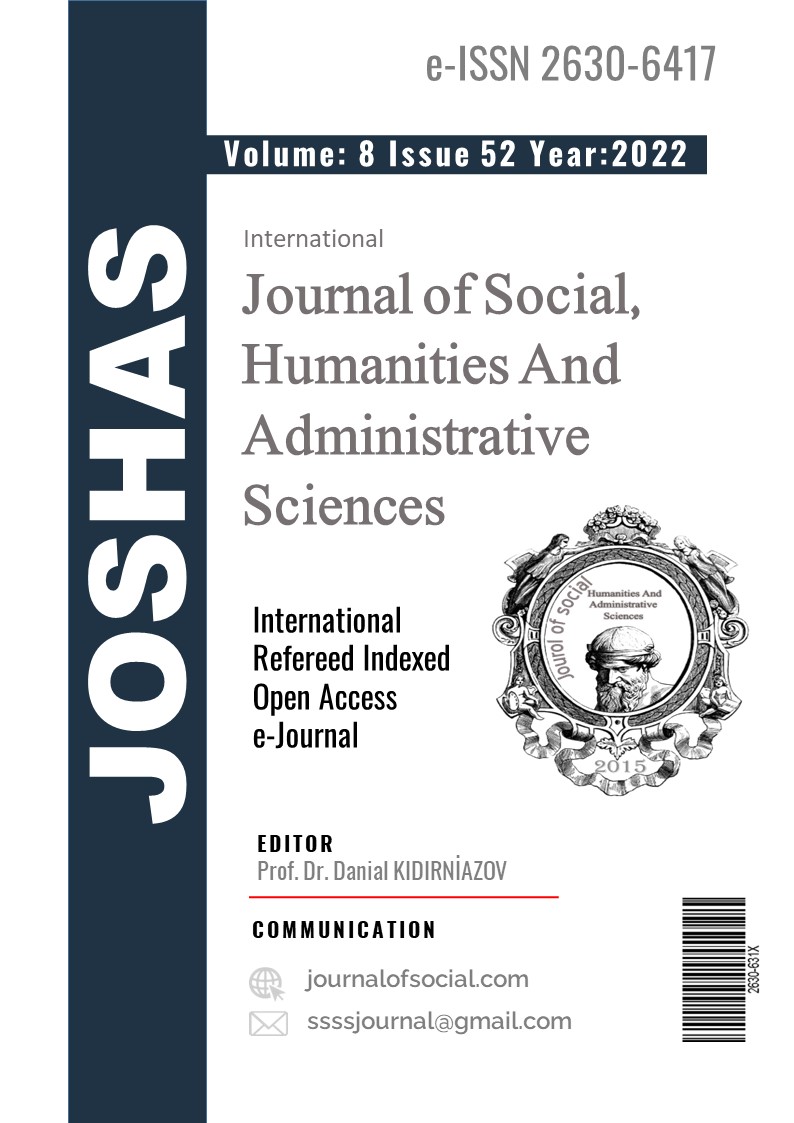Author :
Abstract
Bu araştırma, Sivas ilinde ilköğretim düzeyinde eğitim veren branş veya sınıf öğretmenlerinin mülteci öğrencilerle eğitim-öğretim sürecinde, sürecin en belirleyici parçalarından birisi olarak, yaşadıkları zorlukları belirlemek ve çözüm önerilerini almak amacı ile gerçekleştirilmiştir. Böylelikle ileride mülteci veya sığınmacı çocuklara dair eğitim öğretim çalışmaları bağlamında daha kapsamlı bir hale getirilerek yapılacak çalışmalara temel teşkil etmesi beklenmektedir. Ülkemizin tamamında yaşanan ve güncel bir eğitim problemi olarak karşımıza çıkan bu sorunların toplum dokusuna uyumlu bir şekilde ortadan kaldırılmasına katkı sağlaması öncelikli olarak hedeflenmektedir. Araştırmanın verileri uzman görüşleri alınarak hazırlanan yarı yapılandırılmış görüşme formu ile toplanmıştır. Yarı yapılandırılmış görüşme formu üç bölümden oluşmaktadır. Birinci bölümde katılımcılara ilişkin kişisel bilgiler, ikinci bölümde mülteci öğrencilerin özelliklerine (göç nedenleri, ailelerinin ekonomik durumları, ailelerinin ilgi düzeyleri, Türkçeyi kullanma düzeyi) ilişkin sorular, üçüncü bölümde ise öğrenme ve öğretme süreçlerinde mülteci öğrencilerle yaşanan sorunlara ve çözümlere ilişkin sorular yer almaktadır. Formun analiz edilmesinde betimsel analiz tekniği kullanılmıştır. Mülteci öğrenci okutan öğretmenlerin Sivas ili ölçeğinde yaşadıkları eğitim süreci ile ilgili sorunları ve çözüm önerilerini ortaya koymaya çalıştığımız bu araştırmada karşılaşılan en temel sorunların dil problemi, kültürel uyum problemleri ve öğretmenlere yönelik eğitim çalışmalarındaki yetersizlik olduğu tespit edilmiştir. Bu nedenle de ülke olarak üstlendiğimiz, çok çeşitli milletlerden mülteci çocuklarının eğitimi konusunda karşımıza çıkan temel sorunların başında gelen öğretmenlerimizin yaşadığı problemlerin ele alınması ve çözüm yollarının aranması hedeflenmektedir. Mülteci öğrencilere eğitim veren öğretmenlere daha kapsamlı ve yaygın hizmet içi eğitim verilmesi önerilmektedir. Ayrıca, üniversitelerin, enstitülerin ve diğer yükseköğretim kapsamındaki kurumların da konu dâhilinde öğretmenler için eğitici seminer programları düzenlemeleri sorunların ortadan kalkmasına yardımcı olacağı düşünülmektedir.
Keywords
Abstract
This research was carried out with the aim of determining the difficulties experienced by the branch or classroom teachers teaching at primary education level in Sivas province, as one of the most decisive parts of the education-teaching process with refugee students, and to get solution suggestions. Thus, it is expected that it will form the basis of studies to be carried out by making it more comprehensive in the context of education and training studies on refugee or asylum-seeking children in the future. It is primarily aimed to contribute to the elimination of these problems, which are encountered as a current education problem throughout our country, in harmony with the social fabric. The data of the research were collected with a semi-structured interview form prepared by taking expert opinions. The semi-structured interview form consists of three parts. In the first part, personal information about the participants, in the second part there are questions about the characteristics of refugee students (reasons for migration, their families' economic conditions, their family's interest levels, the level of using Turkish), and in the third part, questions about the problems and solutions experienced with refugee students during the learning and teaching processes. Descriptive analysis technique was used in the analysis of the form. In this research, in which we tried to reveal the problems and solution suggestions of the teachers who teach refugee students in the scale of Sivas province, it was determined that the most basic problems encountered were language problems, cultural adaptation problems and inadequacy in training studies for teachers. For this reason, it is aimed to address the problems experienced by our teachers, which is one of the main problems we have undertaken as a country, and to find solutions to the education of refugee children from various nationalities. It is recommended that more comprehensive and widespread in-service training be given to teachers who teach refugee students. In addition, it is thought that universities, institutes and other higher education institutions organizing educational seminar programs for teachers within the scope of the subject will help to eliminate the problems.
Keywords
- Aksoy, Z., (2012). Uluslararası göç ve kültürlerarası iletişim. Uluslararası Sosyal Araştırmalar Dergisi Cilt:5
- Aksoy, Z., (2012). Uluslararası göç ve kültürlerarası iletişim. Uluslararası Sosyal Araştırmalar Dergisi Cilt:5 Sayı:20, s.292-303
- Birleşmiş Milletler Mülteciler Yüksek Komiserliği(2019).,https://www.unhcr.org/tr.,Erişim tarihi:20.12.2019
- Büyüköztürk. Ş. Çakmak. E. K. Akgün. Ö. E. Karadeniz. Ş. ve Demirel. F. (2016). Bilimsel Araştırma Yöntemleri. Ankara: Pegem Akademi.
- Creswell, J. W., (2017). Karma yöntem araştırmalarına giriş. Pegem Akademi, 1. Baskı, Ankara, Cenevre Sözleşmesi(1951).,http://www.multeci.org.tr., Erişim tarihi:18.09.2019
- Erdem, C., (2017). Sınıfında mülteci öğrenci bulunan sınıf öğretmenlerinin yaşadıkları öğrenimsel sorunlar ve çözüme dair önerileri. Medeniyet Eğitim Araştırmaları Dergisi Cilt:1, Sayı:1, 2017, s.26-42
- Ergüven, N. S., Özturanlı B., (2013). Uluslararası mülteci hukuku ve Türkiye. Ankara Üniversitesi Hukuk Fakültesi Dergisi Cilt:62 Sayı:4 s.1007-1061
- Kağnıcı, D. Y., (2017). Suriyeli mülteci çocukların kültürel uyum sürecinde okul psikolojik danışmanlarına düşen rol ve sorumluluklar. İlköğretim Online Cilt:16 Sayı:4 s.1768-1776
- Okçu, D., (2007). Eğitim hakkı ve tarihsel gelişimi. Yüzüncü Yıl Üniversitesi Eğitim Fakültesi Dergisi Cilt:4 Sayı:1 s.45-59
- Öztürk, F., (2018). Mülteci öğrencilere sunulan eğitim-öğretim hizmetlerinin sosyal bilgiler öğretmen görüşlerine göre değerlendirilmesi. Anadolu Journal of Educational Sciences International, Cilt:8 Sayı:1 s.52-79
- Tunç, A. Ş., (2015). Mülteci davranışı ve toplumsal etkileri: Türkiye’deki Suriyelilere ilişkin bir değerlendirme. Tesam Akademi Dergisi Cilt:2 Sayı:2, s.29-63
- Türkiye Göç İdaresi(2018).,http://www.goc.gov.tr., Erişim tarihi:19.11.2019UNICEF(2018).,https://www.unicef.org/turkey., Erişim tarihi:20.10.2019
- Ünal, S.,(2014). Türkiye’nin beklenmedik konukları: “öteki” bağlamında yabancı göçmen ve mülteci deneyimi. Zeitschrift für die Welt der Türken Cilt:6 Sayı:3, s.65-89
- Yavuz, Ö., Mızrak, S., (2016). Acil durumlarda okul çağındaki çocukların eğitimi: Türkiye’deki Suriyeli mülteciler örneği. Göç Dergisi Cilt:3 Sayı:2 s.175-199
- Yıldırım, A. , Şimşek, H., (2018). Sosyal Bilimlerde Nitel Araştırma Yöntemleri. Seçkin Yayınları. 11.Baskı., AnkaraYıldız, K., Ünlü, Ü., Sezer, M., (2014). Mülteci- sığınmacı cinnetleri ve toplum “her insanın huzur içinde, kendievinde, sevdiği insanların içinde ve vatanında ölme hakkı vardır!”. KMÜ Sosyal ve Ekonomik Araştırmalar Dergisi s.42-50
